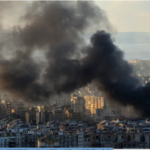Israeli anger at ‘irresponsible and hasty’ ceasefire
Benjamin Netanyahu framed the ceasefire agreement within the context of what he described as Israel’s “unprecedented achievements” during the past year of a multi-front conflict.
He claimed that Israel had set Hezbollah back “decades” and that the group was no longer the same as before.
Much of the focus was on Israel’s strength in carrying out what it believed was necessary, whether in Gaza, Lebanon, or elsewhere, despite facing international opposition.
Netanyahu also presented strong arguments in favor of the ceasefire, explaining that it would enable Israel to “focus on the Iranian threat.” He emphasized that Israel would maintain full military freedom to address any emerging Hezbollah threats.
On Tuesday, Israel’s military reported hitting 180 targets in Lebanon over the past 24 hours. Meanwhile, along the Israeli side of the border, there have been continuous warnings of rocket and drone attacks originating from Lebanon.
Neither party involved in the ceasefire wants it to be perceived as a surrender.
However, Netanyahu faces accusations of surrender from both his political opponents and some of his own allies.
A recent poll revealed that over 80% of Netanyahu’s support base opposed the deal, while residents in northern Israel, many of whom have been evacuated, are also expressing anger.
Nationally, the picture was more split, however. One poll showed 37% of Israelis in favour of the ceasefire, 32% against and 31% saying they didn’t know.
Shelly, an English teacher in Shlomi, said a ceasefire was an “irresponsible and hasty political decision”.
Rona Valency, evacuated from kibbutz Kfar Giladi on 8 October last year, told me she wanted to go home, and that a ceasefire was needed, but that the idea of Lebanese residents returning to these villages gave her “a real sense of unease and fright”.
From Kfar Giladi there are clear views of the Lebanese village of Odaisseh just across the valley.
“The only thing I can hope for is that Hezbollah will not infiltrate these villages and build a new network,” Rona told me. “Apart from completely erasing these villages, and having no people there, there is no real physical thing that can make me feel safe. It’s just, you know, hope.”
Her husband, Onn, said the key to security lay, not in the terms of the ceasefire agreement, but in people “understand[ing] again, where we live; understand[ing] some things that a lot of us forgot”.
He said he didn’t trust the Lebanese army, nor the Americans, to restore security along the border.
“I trust only our army,” he said. “I think if the army won’t be there, it will be very, very hard to get the citizens back.”
This war has delivered a lot of military achievements for Israel – Hezbollah is weakened, its arsenals and infrastructure depleted, and its solidarity with Hamas broken.
But Israel’s armed forces are tired, its economy is suffering, and tens of thousands of its residents are displaced.
Still, many here are urging Benjamin Netanyahu to continue the war in Lebanon – asking why the prime minister who has vowed to continue fighting in Gaza until “total victory” is signing a ceasefire in the north?



